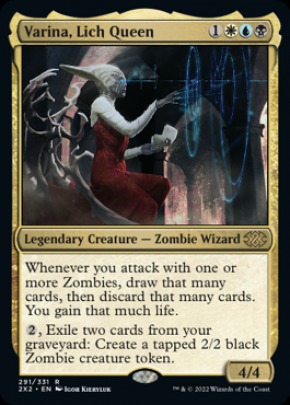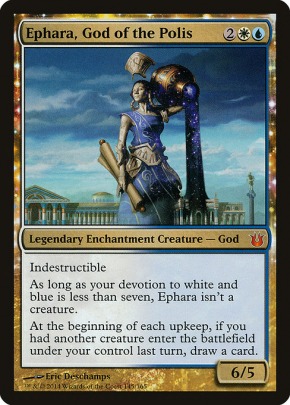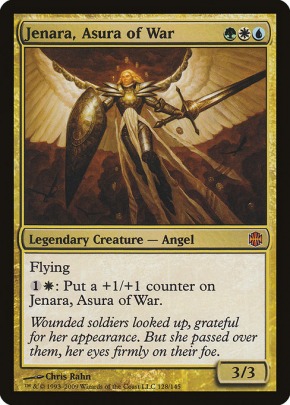Does this work within the rules?
.
Witherhorn --
Creature - Unicorn Horror
Witherhorn isn't put into the graveyard for having zero or less toughness.
If you would be dealt damage, put a -1/-1 counter on Witherhorn instead.
At the end of turn, if Witherhorn has zero or less toughness, lose one life for each point of toughness less than zero it has.
4/4
.
The usual argument against the first ability is that it interacts weirdly with dealing damage. But my understanding is that "dealing 0 damage" isn't a thing, so it just ends up that dealing any amount of damage kills it.
Is there a better way to word the third ability?
Having zero or less toughness
- OneAndOnly
- Posts: 2368
- Joined: 4 years ago
- Pronoun: he / him
The relevant rules are:
So yes, you could use the first ability to override 704.5f and cause it to not die. However, 704.5g only applies if the creature has positive toughness, which means that what happens when it has negative toughness and takes damage is... ambiguous and/or confusing. I'd recommend taking a page from Phyrexian Hydra and just preventing the damage the damage dealt to it outright (and presumably applying -1/-1 counters).comprehensive rules wrote:704.5f If a creature has toughness 0 or less, it's put into its owner's graveyard. Regeneration can't replace this event.
704.5g If a creature has toughness greater than 0, it has damage marked on it, and the total damage marked on it is greater than or equal to its toughness, that creature has been dealt lethal damage and is destroyed. Regeneration can replace this event.
- OneAndOnly
- Posts: 2368
- Joined: 4 years ago
- Pronoun: he / him
The thing is, its third ability is only meaningful if it has negative toughness.
I'm not certain I see why the first phrase of 704.5g is essential. If the sentence began, "If a creature has damage marked on it, and the total damage marked on it is greater than or equal to its toughness...." If Witherhorn has zero toughness, you have to deal damage to it for it to die. But "dealing 0 damage" is in Magic, a non-event, so the situation of "zero damage marked = zero toughness" can't ever happen. This leaves "deals some positive integer of damage = greater than Witherhorn's toughness," which still yields the correct result.
Is there another existing cornerstone case Im not aware of where a creature can have 0 toughness and not die, making the first phrase required?
I'm not certain I see why the first phrase of 704.5g is essential. If the sentence began, "If a creature has damage marked on it, and the total damage marked on it is greater than or equal to its toughness...." If Witherhorn has zero toughness, you have to deal damage to it for it to die. But "dealing 0 damage" is in Magic, a non-event, so the situation of "zero damage marked = zero toughness" can't ever happen. This leaves "deals some positive integer of damage = greater than Witherhorn's toughness," which still yields the correct result.
Is there another existing cornerstone case Im not aware of where a creature can have 0 toughness and not die, making the first phrase required?
Last edited by OneAndOnly 1 year ago, edited 1 time in total.
No, having zero toughness always causes a creature to die. The reason why the two rules are separate are due to regeneration - if a creature has positive toughness and takes damage, regeneration will intervene and remove all the damage, so the creature doesn't die. Regeneration can't prevent a creature dying from 0 toughness. (Similar story for indestructible, which, again, prevents dying due to damage but not due to 0 toughness)OneAndOnly wrote: ↑1 year agoIs there another existing cornerstone case Im not aware of where a creature can have 0 toughness and not die, making the first phrase required?
edit: after rereading your comment, I don't think this answers your question. That said, my guess is that they don't want two different state-based effects causing it to die at the same time, so they're making it so that only one rule can ever apply.
I don't think the first sentence is necessarily there to account for a corner case where something can survive on 0 or less toughness. It seems to be more about the fact that it clarifies how things work when toughness does get reduced to 0 or less. For example, a 3/3 with 2 damage marked on it but then gets -1/-1 is destroyed because of that full rule. However, a 3/3 with 2 damage on it that then gets -4/-4 is *not* destroyed (it is just put into the yard) which is why that first sentence is there. Mookie makes a good point in that the first sentence ensures there isn't an overlap in the SBAs.
In any case, the current rules don't cover your card. I believe that your card would work just fine (with perhaps a slight update to 704.5g as a result to cover this) but it is such a small deviation that it doesn't seem to break much. The important bit is that the rules are written for cards that exist so if this ever did exist, a rules update would likely accompany it. So, while I agree with Mookie that it would currently be confusing in relation to that rule, a rule update could clarify it. I am not sure it is the greatest idea for a card in general due to the confusion it could cause, but if you absolutely want to do it, it doesn't look too outlandish.
The wording of the third ability seems fine though I don't think you need the intervening if clause. Without it, it just leads you to losing 0 life in the case that its toughness is 0 or greater which is fine. It also opens the door for being able to respond to the ability if you want to do that.
You could try something like "At the beginning of your upkeep, lose X life where X is 0 minus this creature's toughness. This means 0 - (-4) gets you to 4 and 0-3 (if the toughness is still positive for example) would lead to -3 but rule 107.1b covers this to just make the latter become 0. It doesn't really clear up any confusion though so I think your wording is likely the clearest you can make it.
In any case, the current rules don't cover your card. I believe that your card would work just fine (with perhaps a slight update to 704.5g as a result to cover this) but it is such a small deviation that it doesn't seem to break much. The important bit is that the rules are written for cards that exist so if this ever did exist, a rules update would likely accompany it. So, while I agree with Mookie that it would currently be confusing in relation to that rule, a rule update could clarify it. I am not sure it is the greatest idea for a card in general due to the confusion it could cause, but if you absolutely want to do it, it doesn't look too outlandish.
The wording of the third ability seems fine though I don't think you need the intervening if clause. Without it, it just leads you to losing 0 life in the case that its toughness is 0 or greater which is fine. It also opens the door for being able to respond to the ability if you want to do that.
You could try something like "At the beginning of your upkeep, lose X life where X is 0 minus this creature's toughness. This means 0 - (-4) gets you to 4 and 0-3 (if the toughness is still positive for example) would lead to -3 but rule 107.1b covers this to just make the latter become 0. It doesn't really clear up any confusion though so I think your wording is likely the clearest you can make it.
- OneAndOnly
- Posts: 2368
- Joined: 4 years ago
- Pronoun: he / him
Thanks, both of you!








